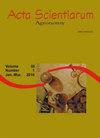大豆在营养和生殖阶段对落叶的耐受性与水分限制的关系
IF 1.2
4区 农林科学
Q3 AGRONOMY
引用次数: 1
摘要
缺水会降低叶片膨胀和光合效率,潜在地降低抵抗叶面积(LA)损失的能力。本研究旨在评价水分限制对大豆营养发育和生殖发育时期抗落叶性的影响。在2017/2018生长季节,在巴西圣卡塔琳娜州Lages的一个温室进行了两项实验。品种NA 5909 RG遭受了3个WR水平(无、中等和严重)和5个落叶水平(0、17、33、50和67%)。第一次试验中,叶片脱落发生在V6期,第二次试验中,叶片脱落发生在R3期。WR发生在落叶后7天。与WR无关,V6和R3落叶后,R2和R5的LA分别下降了27.5%和64.6%。V6和R2之间的LA不受WR和落叶的影响。中度或重度WR降低了植物在R3和R5之间恢复LA的能力。在不考虑落叶的情况下,与对照相比,严重WR在营养期使籽粒产量下降22.2%,在繁殖期使单株籽粒产量下降21.2%。无论水分比如何,最高落叶水平在V6期和R3期的单株籽粒产量分别比对照降低24.7%和24.3%。在营养和生殖阶段施加WR没有增加落叶敏感性。本文章由计算机程序翻译,如有差异,请以英文原文为准。
Soybean tolerance to defoliation at the vegetative and reproductive stages as a function of water restriction
Water deficiency reduces leaf expansion and photosynthetic efficiency, potentially reducing the ability to withstand leaf area (LA) loss. This study aimed to evaluate the effects of water restriction on soybean tolerance to defoliation in the vegetative and reproductive periods of development. Two experiments were conducted in a greenhouse located in Lages, Santa Catarina State Brazil, during the 2017/2018 growing season. Cultivar NA 5909 RG was subjected to three WR levels (none, moderate, and severe) and five defoliation levels (0, 17, 33, 50, and 67%). Defoliation occurred at the V6 stage in the first experiment and R3 in the second. WR occurred for 7 days after defoliation. LA at R2 and R5 after defoliation at V6 and R3 decreased by 27.5 and 64.6%, respectively, regardless of WR. LA between V6 and R2 was not influenced by WR or defoliation. Moderate or severe WR reduced plant ability to recover LA between R3 and R5. Severe WR decreased grain production by 22.2% in the vegetative period and 21.2% per plant in the reproductive period compared to that of the control, regardless of defoliation. The highest defoliation level reduced grain production per plant by 24.7 and 24.3% relative to the control at stages V6 and R3, respectively, regardless of WR. WR imposed at the vegetative and reproductive stages did not increase defoliation sensitivity.
求助全文
通过发布文献求助,成功后即可免费获取论文全文。
去求助
来源期刊

Acta Scientiarum. Agronomy.
Agricultural and Biological Sciences-Agronomy and Crop Science
CiteScore
2.40
自引率
0.00%
发文量
45
审稿时长
>12 weeks
期刊介绍:
The journal publishes original articles in all areas of Agronomy, including soil sciences, agricultural entomology, soil fertility and manuring, soil physics, physiology of cultivated plants, phytopathology, phyto-health, phytotechny, genesis, morphology and soil classification, management and conservation of soil, integrated management of plant pests, vegetal improvement, agricultural microbiology, agricultural parasitology, production and processing of seeds.
 求助内容:
求助内容: 应助结果提醒方式:
应助结果提醒方式:


